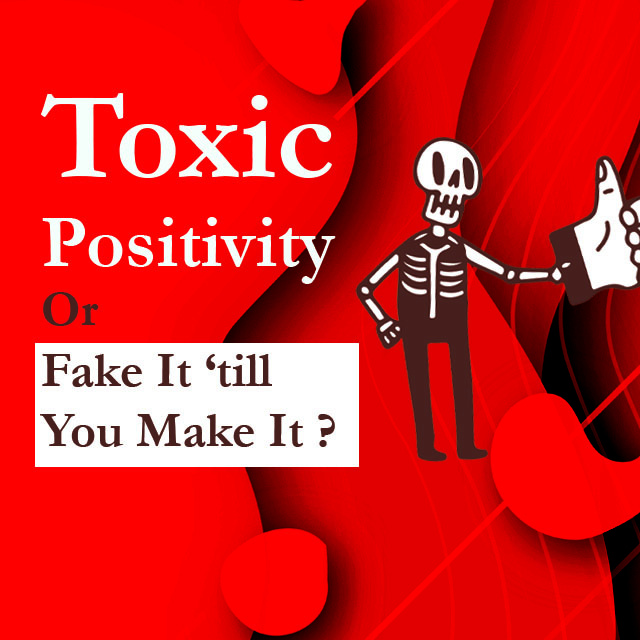How much positive talk is actually doing self-harm? Is toxic positivity real? Research shows it’s all a matter of timing and response.
The stand of social media recently introduced us to many new behavior terms. From self-love, ghosting, body shaming, red flags, to self-boundaries, backhanded compliments, including toxic positivity.
But maybe toxic positivity wasn’t that toxic after all. The progressive change on how the society perceived certain attitude are now heavily depended on the algorithm of social media. And then, the pandemic emphasizes this shift more vigorously. Lockdowns wipe out nearly other social forms of interactions except social media.
What happened to the phrase “fake it till you make it” ? why suddenly the effort to create positivity overlooked as something toxic?
Let’s start from the very own definition of toxic positivity.
Toxic positivity or sometimes positive toxicity is a dysfunctional approach to emotional management that happens when people do not fully acknowledge negative emotions, particularly anger and sadness. Wikipedia
Toxic Positivity or Toxic Demand
Often, the first impulse that appear when we saw a friend crying uncontrollably out of sadness is to comfort them. We say things like “everything is going to be okay.” To a closer family members, even a baby we would lull them “sshh, there, there…”. There is a desire to put the meltdown away. A call to end the feelings of agony as soon as possible. It’s completely natural and very much human being. So, without understanding much further we also say : “Choose to be happy.” or something as simple as “Cheer up!”
Other responses would’ve felt wrong. For example : To just sit and watch them having a breakdown, which in a certain extent can only be done by a really stone-cold person or a professional in psychology. But now, saying comforting things to soothe suffering emotions as an act of human-nature, considered to be obscurely neglecting the reality of what they feel. The remarks of “Dysfunctional approach” on the definition of toxic positivity has to be sorted out.
Building a stronger structure on perceiving things better
According to Konstantin Lukin Ph.D. , accepting difficult emotion can endorse coping mechanism and will eventually help lessen the volume of the emotion itself. These unwanted emotions will bring us to finally grasp on what has happened to us. It can create warnings on certain events, such as the experience of being mugged, or betrayed by a partner. Marking our memories with impressions on what we’re going through. Building a stronger structure on perceiving things better. Eventually, it will lead into a better understanding of ourselves as we evolved and grow more resilience in time.
The Exaggeration
While there is a tendency of a most influencers on social media to sell positivity, we have to draw the line. In difficult times, we might want to blame ourselves and show everyone that we are not weak. This self-blame creates a vicious multiplying of another emotions that in the end we couldn’t contained it. In that state, we find blame in people that tried to calm us, or making us feel better as a wrong gesture. The misunderstood “Toxic Positivity”.
The term fake it till you make it was mention In the Law of attraction movement, “act as if you already have it”, or simply “act as if”, is a central concept:
How do you get yourself to a point of believing? Start make-believing. Be like a child, and make-believe. Act as if you have it already. As you make-believe, you will begin to believe you have received.
— Rhonda Byrne, The Secret (2006)
Sought as a “make-believe” way on being stoic, this English aphorism is also a form of therapeutic technique in the old times (1920’s) by Alfred Adler. A role play that is still used until today to alter a specific dysfunctional behaviours.
In the long run it is also applicable in order to survived a critical condition and be what we are aiming to achieved. Hard and sounded tough, some people choose this when they fall, and wanting to get back up sooner. But is it have to be right away ?
Positivity For Hope
To come into a conclusion, not all constructive positivity are toxic. Rather, it is always a choice. Different for each and every unique individuals. Cassie Moon, Psy.D, Staff Psychologist and Outreach Director Student Counseling Center University of Maryland: Baltimore suggested that we can change the way we respond or react. “Whether you say it to yourself or to others, toxic positivity is ineffective and can lead to a person feeling worse, despite your best intentions. Instead of positivity, try for validation and hope.”
A few points which need to be clear out are ;
- Forced positives remarks without addressing current emotions, shows a lack of empathy and a hint of underestimating. Belittling our feelings wrapped with best intentions is what constitutes real toxic positivity. Emotions should be allowed to have the chance to wind down. It should be respectfully validated.
- Sadness, anger, shock, and other negative emotions have an equal right amount of time to stay as much as other delightful emotions. Grieving for deaths or terminal illnesses could even need a little more time to linger.
- Nothing can diminished the will to move on but ourselves. Anyone can say whatever they want to change your mind. In the end, the fate of our life are mostly driven by our own thoughts.
- But when you realized time has passed you by, there comes a moment that you start asking yourself ; “when will I move on?” It could be a signal that you’re ready for positive reinforcement. It’s time you tell yourself; it’s been a while since we try to get back on that saddle and ride again.
- Fake it till you make it is only effective after your feelings are validated. Let those emotional baggages rests, instead of accumulating mental pressure.
Author: Fraya
A writer and entrepreneur with profound interest in humankind research and insights. An avid coffee drinker and book hoarder. Hours and days spent in Jakarta.
The Haptic Room is supported by our readers. Our site may contain links to affiliate websites, and if you make a purchase through these links, we receive a commission to support our site.

